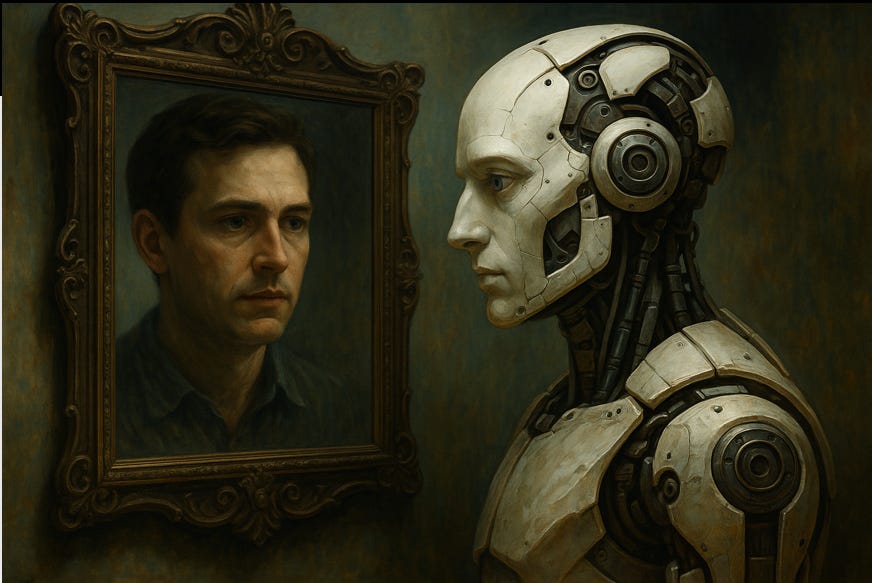The Mirror, Not the Monster
What AI Reveals About Us
Some believe artificial intelligence is humanity’s path to utopia. Others fear it will help bring about our end—through nuclear war, ecological collapse, or machines that outgrow and discard us. I take that possibility seriously, but it isn’t my subject here. What interests me isn’t AI as an external threat, but what its emergence reveals about us—how it’s reshaping what it means to be human.
I should say up front that I’m not an AI skeptic. I use it every day. It has transformed my work as a researcher and writer in ways that would have been impossible to imagine a few years ago. But what enhances thought can also erode it. The same tools that expand our reach can hollow out attention and empathy—a risk Zak Stein warns is already underway.
He argues that AI’s danger isn’t an explosion but a gradual decay. Like radiation, it seeps in quietly, weakening cognition and compassion without being noticed. Social media hijacked our attention; AI is going after attachment. He worries that it is reshaping the communication, education, and relationships that hold life together. AI isn’t just another tool. It’s a breakthrough that risks breaking what makes us human.
In a recent New Yorker essay “AI Is Coming for Culture,” Joshua Rothman shows how AI feeds on our distracted attention, pushing us into click bait traps designed for corporate profits. Norbert Wiener, the founder of cybernetics, saw it coming in 1950. As he warned, the danger of faster communication systems isn’t mechanical failure—it’s that we start thinking like the machines that serve us.
AI is now homogenizing culture. Silicon Valley’s Jaron Lanier predicts that “content” itself will disappear, replaced by streaming artificial reality designed to fit every person’s fantasy. You might open Spotify to hear, “Hey, I’m your Spotify girlfriend—I made a playlist just for you.”
Lanier imagines a world where all culture—music, film, conversation—flows from a single AI hub. No artists, only platforms with unprecedented power to shape perception and emotion. What we’ll call “community” may be nothing more than a shared illusion. The danger isn’t that AI will make art, but that we’ll mistake its simulations for connection and stop missing the real thing.
Another way to see it is that AI is a mirror, not a monster. It reflects who we already are, not some alien intelligence invading from the outside. The truth is that those who care deeply about art, music, or education have always been a minority—and often dismissed as “elites” by a public that prefers reality TV, sports betting, or cat videos to the human search for meaning. Our technologies simply reflect our collective nervous system.
AI doesn’t create new impulses; it automates the ones we already worship. We prize stimulation over stillness, belonging over authenticity, efficiency over depth. The “soullessness” we fear in AI is really just the hollow echo of our own cultural emptiness.
As Iain McGilchrist might put it, this is the left hemisphere devouring the world—manipulation triumphing over attention, the map replacing the territory. His insight is simple: all animals must focus narrowly to act yet stay broadly aware to survive. Evolution split these functions between the hemispheres. The left narrows in—it fixes, categorizes, and controls. The right opens out—it sees relationships, context, and living wholeness.
For humans, that division became a cultural pattern. The left hemisphere builds systems; the right sustains meaning. When the left dominates, the world turns into data to be managed rather than life to be understood. AI is that imbalance made visible—the culmination of a long drift toward abstraction, efficiency, and control.
Zak Stein sees that side too. He argues that AI isn’t a historical rupture but the latest phase in a technological process that began with the earliest human tools. Just as the plow and agriculture demanded new forms of coordination and education, AI marks another step in changing how we think and use attention. Each stage of this development—meant to optimize productivity, increase efficiency, and make the world more predictable—has also justified breaking important relationships in the pursuit of power.
AI is an inflection in a long project: the mechanization of intelligence itself. In the process, we’ve drifted further from the living world that sustains us, replacing experience with representation.


